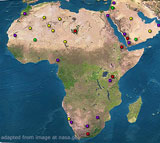Russia Beyond the Headlines: Mandela and the Soviet Union: The struggle against apartheid

(Russia Beyond the Headlines – rbth.ru – Ajay Kamalakaran, RBTH – December 6, 2013)
As the world mourns the death of the great statesman, RBTH looks back at the role Russia and the Soviet Union played in the struggle against apartheid.
When Nelson Mandela turned 95 in July, Russian President Vladimir Putin gave one of the most glowing tributes to the great leader. “Your name is inseparably linked with an entire epoch of Africa’s modern history that heralded the building of the new and democratic Republic of South Africa,” Putin said. He also praised Mandela’s role in developing ties between Russia and South Africa.
No discussion about South Africa’s struggle against the tyranny of apartheid can be complete without mentioning the role of the Soviet Union. On April 30, 1999, Mandela, on a state visit to Moscow, was awarded two honorary doctorates from the Russian Academy of Sciences. As he accepted the honors, Mandela said: “I would interpret your action also as a tribute to the intellectuals of our country, of all colors and backgrounds, who have followed their calling to fashion the complex experience and aspirations of our diverse society into a single, realizable vision of a society at peace with itself.”
During the state visit, Mandela expressed gratitude for the “solidarity of the Russian people in the South African fight against apartheid and for freedom.”
Although apartheid formally ended after the fall of the Soviet Union, Soviet ideology was influential in the ideas that led to the end of the system. The Soviet Union was at the forefront of the anti-colonial and anti-apartheid movements and the Soviet Union was the biggest benefactor of the African National Congress (ANC).
From the 1960s until the early 1990s, the Soviet Union trained thousands of cadres of MK, the armed wing of the ANC to fight against the racist regime. According to the website South African History Online, “The Soviets helped the ANC maintain structures that came under enormous pressure, especially through the slump in the 1970s. After that, MK cadres trained in the USSR launched devastating attacks that added to the pressure bringing apartheid leaders to the negotiating table.”
It is easy for critics of Mandela to label him a communist and downplay Russia’s intentions in ending state-sponsored racism in South Africa. Mandela refuted these claims in his autobiography, The Long Walk to Freedom. He wrote, with a tinge of humor, “There will always be those who say that the Communists were using us. But who is to say that we were not using them?”
Mandela maintained a soft spot for Russia even after the collapse of the Eastern bloc. In 1990, the same year that he was released from prison, the Soviet Union awarded Mandela the Lenin International Peace Prize.
He was the last person to receive the prize, which was no longer awarded after the fall of the Soviet Union. However, Mandela never received the medal itself.
After his 1999 state visit, Mandela asked his aides to find about what happened to the medallion. In 2002, Russian Ambassador to South Africa Andrei Kushakov gave the gold medal to the statesman.
Upon receiving the prize, Mandela said: “Much has changed in the world since the award was given to us, but the world’s need for the human solidarity which that generous gesture demonstrated remains as much as ever.”
Mandela’s state visit in 1999 set the tone for greater cooperation between Russia and South Africa.
During that visit, Mandela and then-President Boris Yeltsin signed a declaration pledging to boost political ties and economic relations in areas such as gold and diamond production.
Since that time, the countries have stepped up bilateral and multilateral cooperation. Moscow was the strongest advocate for South Africa to be included in the grouping of the world’s most dynamic emerging economies, Brazil, Russia, India and China, which was renamed from BRIC to BRICS.
Surely the increase of ties and growing solidarity between the members of this grouping would have been something Nelson Mandela would have supported.
—–
Russian president sends his condolences over Nelson Mandela’s death
Russian President Vladimir Putin has offered his condolences following the death of Nelson Mandela, South Africa’s long-time leader and a prominent political figure, the Kremlin press service said.
Mandela’s name is inseparably linked with an entire epoch in Africa’s modern history, which witnessed the victory over apartheid and the establishment of the Republic of South Africa as a democratic state, Putin said in his message.
Article also appeared at http://rbth.ru/international/2013/12/06/mandela_and_the_soviet_union_the_struggle_against_apartheid_32329.html
